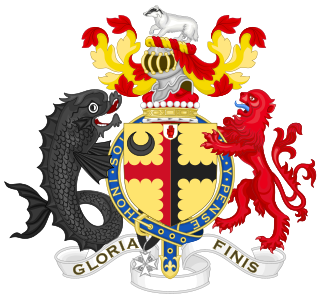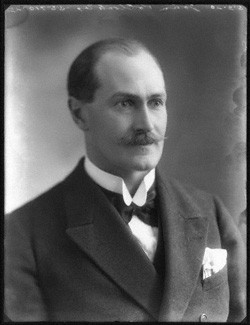
Earl Waldegrave is a title in the Peerage of Great Britain. It was created in 1729 for James Waldegrave, 2nd Baron Waldegrave.

Baron Saye and Sele is a title in the Peerage of England held by the Twisleton-Wykeham-Fiennes family. The title dates to 1447 but it was recreated in 1603. Confusion over the details of the 15th-century title has led to conflicting order for titleholders; authorities such as Burke's Peerage and Debrett's Peerage do not agree on whether or not the 1447 creation is still extant.

Earl of Egmont was a title in the Peerage of Ireland, created in 1733 for John Perceval, 1st Viscount Perceval. It became extinct with the death of the twelfth earl in 2011.

Earl of Lonsdale is a title that has been created twice in British history, firstly in the Peerage of Great Britain in 1784, and then in the Peerage of the United Kingdom in 1807, both times for members of the Lowther family.

Earl of Iddesleigh, in the County of Devon, is a title in the Peerage of the United Kingdom. It was created in 1885 for the Conservative politician Sir Stafford Northcote, 8th Baronet, of Pynes in the parish of Upton Pyne near Exeter in Devon and lord of the manor of Iddesleigh, 28 miles north-west of Pynes. He served as President of the Board of Trade, Secretary of State for India, Chancellor of the Exchequer, First Lord of the Treasury and Foreign Secretary and was Joint Leader of the Conservative Party from 1881 to 1885. Northcote was made Viscount St Cyres, of Newton Saint Cyres in the County of Devon, at the same time he was given the earldom. This title is also in the Peerage of the United Kingdom.

Viscount Brookeborough, of Colebrooke in the County of Fermanagh, is a title in the Peerage of the United Kingdom. It was created in 1952 for the Ulster Unionist politician and Prime Minister of Northern Ireland, Captain The Rt. Hon. Sir Basil Brooke, 5th Bt., P.C. (N.I.), M.P..
Baron Wolverton, of Wolverton in the County of Buckingham, is a title in the Peerage of the United Kingdom. It was created in 1869 for the banker George Glyn. He was the fourth son of Sir Richard Carr Glyn, 1st Baronet, of Gaunt's House, Lord Mayor of London in 1798, himself the fourth son of Sir Richard Glyn, 1st Baronet, of Ewell, Lord Mayor of London in 1758. Lord Wolverton was succeeded by the eldest of his nine sons, the second Baron. He was a Liberal politician and served under William Ewart Gladstone as Paymaster-General and as Postmaster General. He was childless and was succeeded by his nephew, the third Baron. He was the eldest son of Vice-Admiral the Hon. Henry Carr Glyn, younger son of the first Baron. He died childless the following year aged only twenty-six, and was succeeded by his younger brother, the fourth Baron. He served as Vice-Chamberlain of the Household from 1902 to 1905 in the Conservative administration of Arthur Balfour. On the death in 1988 of his second but eldest surviving son, the fifth Baron, this line of the family failed. The title was inherited by the late Baron's second cousin, the sixth Baron. He was the grandson of the Hon. Pascoe Glyn, younger son of the first Baron. As of 2011 the title is held by his grandson, the eighth Baron, who succeeded in 2011.
The Pease family is an English and mostly Quaker family associated with Darlington, County Durham, and North Yorkshire, descended from Edward Pease of Darlington (1711–1785).

There have been three baronetcies created for persons with the surname Chapman, one in the Baronetage of Great Britain, one in the Baronetage of Ireland and one in the Baronetage of the United Kingdom. Two of the creations are extinct while one is extant.
There have been six baronetcies created for persons with the surname Brooke, one in the Baronetage of England, one in the Baronetage of Ireland and four in the Baronetage of the United Kingdom. As of 2015 four of the creations are extant, though one has been subsumed into a peerage.
This article about records of members of parliament of the United Kingdom and of England includes a variety of lists of MPs by age, period and other circumstances of service, familiar sets, ethnic or religious minorities, physical attributes, and circumstances of their deaths.

Sir Alfred Frederick Bird, 1st Baronet was an English chemist, food manufacturer and Conservative Party politician. He is best remembered as the proprietor of Alfred Bird & Sons, a company founded by his father Alfred Bird, the inventor of baking powder and the powdered custard that bears his name.
There have been eight baronetcies created for persons with the surname Graham, two in the Baronetage of Nova Scotia, two in the Baronetage of England, one in the Baronetage of Great Britain and three in the Baronetage of the United Kingdom.
There have been three baronetcies created for persons with the surname Clayton, two in the Baronetage of Great Britain and one in the Baronetage of the United Kingdom. One creation is extant as of 2021.
Three baronetcies were created for different families bearing the name of Halford, but related to one another. The first baronetcy was created in 1641 for Richard Halford in the Baronetage of England. It became extinct in 1780 with the death of the seventh and last baronet. The second baronetcy was created in 1706, also in the Baronetage of England, but became extinct in 1720 in the second generation. The third and last baronetcy was created in 1809 in the Baronetage of the United Kingdom for a prominent physician descended maternally from the fifth Baronet of the previous creation. It too became extinct with the death of the fourth Baronet in 1897.
The office of Lord Mayor of Liverpool has existed in one form or another since the foundation of Liverpool as a borough by the Royal Charter of King John in 1207, simply being referred to as the Mayor of Liverpool. The position is now a mostly ceremonial role. The current Lord Mayor of Liverpool is Roy Gladden, who has held the post since May 2022.

Sir Frederick John Pollock, 4th Baronet was an English historian, journalist and translator.
Sir Francis Salwey Winnington, 5th Baronet DL JP was an English baronet.







